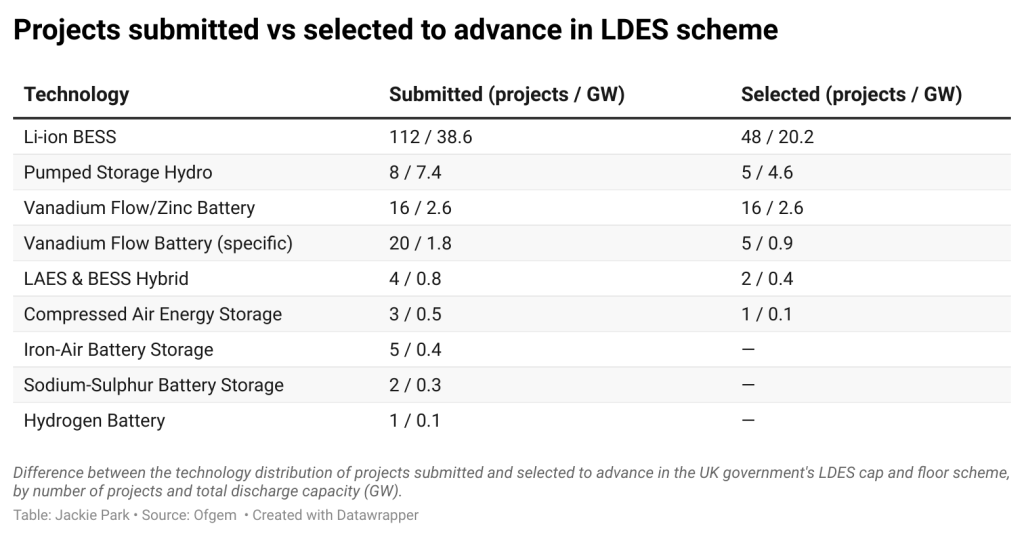
UK energy regulator the Office of Gas and Electricity Markets (Ofgem) has cleared 77 long-duration energy storage (LDES) projects to proceed to the assessment phase of the government’s LDES cap and floor scheme.
The approved projects represent a total discharge capacity of 28.7GW and feature a range of storage technologies including lithium-ion (Li-ion) batteries, flow batteries, pumped hydro storage (PSH), liquid air energy storage (LAES) and compressed air storage.

Discover B2B Marketing That Performs
Combine business intelligence and editorial excellence to reach engaged professionals across 36 leading media platforms.
A total of 71 of the projects fall under ‘track 1’, slated for delivery by 2030, while six ‘track 2’ projects aim for completion by 2033.
Ofgem launched the cap and floor scheme in April to encourage investment in projects capable of storing and releasing electricity for at least eight hours. It drew 171 proposals totalling 52.6GW of discharge capacity.
Li-ion battery energy storage systems (BESS) dominated the initial submissions with 112 projects, making up nearly three-fourths (38.6GW) of the total proposed capacity. While fewer than half of the projects made the cut, the 48 selected still account for the lion’s share of the approved capacity at 20.2GW, easing earlier concerns that the programme might sideline the technology.
In April, a coalition representing around 37% of the UK’s operational storage fleet sent an open letter to Ofgem warning that the initiative could disadvantage BESS. Early government consultations had suggested that mature technologies – particularly Li-ion BESS – might be excluded as they can already secure market-based financing.

US Tariffs are shifting - will you react or anticipate?
Don’t let policy changes catch you off guard. Stay proactive with real-time data and expert analysis.
By GlobalDataWhile losing roughly 57% of its project count – a steeper decline than the overall acceptance rate of around 45% – may indicate Ofgem’s tougher scrutiny of Li-ion BESS, taking the majority share of approvals indicates that its technological maturity and scalability has not gone unnoticed.
All 16 zinc-vanadium hybrid flow battery bids moved forward, totalling 2.6GW, whereas only five of the 20 vanadium flow battery projects advanced, slimmed from the proposed 1.8GW to 0.9GW approved.

PSH projects demonstrated relatively strong retention, from eight project submissions (7.4GW) to five projects approved (4.6GW), suggesting strong regulatory or technical appeal.
Two of four LAES/BESS hybrid project submissions progressed, with 0.4GW of total approved capacity.
One of three compressed air energy storage projects are to move forward, representing just 0.1GW of total capacity.
Submissions also included five iron-air battery storage projects, two sodium-sulphur batteries and one hydrogen battery, none of which were given the green light.
UK Energy Minister Michael Shanks said of the scheme’s progression: “This is another huge step forward in reversing the legacy that has seen no new long duration storage built for 40 years – a technology that will see Britain take back control of its energy supply and protect billpayers for good.
“By scaling this up, we can transform the way electricity is supplied in this country when demand is high – using stored up low-cost, homegrown solar and wind power to help end our reliance on costly fossil fuel markets once and for all.”
Ofgem will now require detailed submissions from the 77 shortlisted projects’ developers for final review. After further assessment, the regulator expects to release a preliminary list of projects eligible for the scheme in spring 2026 and provide final approvals by the summer of the same year.





